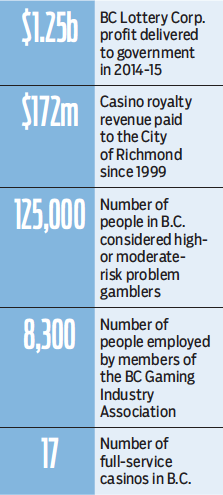B.C.'s private gambling companies, competitors for slot machine and table revenue, are now speaking with one voice.
The BC Gaming Industry Association (BCGIA) held its first major meeting last November. The group is aiming to represent itself with partner BC Lottery Corp. (BCLC) and the central government, as well as promote the industry to the public.
BCLC has acknowledged its core casino gamblers are aging while, in some communities, the public has resisted expansion proposals.
BCGIA executive director Ernest Yee said he was unavailable for an interview but in an email stated that “BCGIA seeks to enhance relationships, education and advocacy on behalf of private-sector gaming operators in B.C. by connecting the gaming industry with community stakeholders, government, media and the public.”
This isn’t the first time private operators have united.
Between 2001 and 2011, former BC Ferries president and deputy minister Frank Rhodes was the registered lobbyist for Registered Gaming Management Companies – a group of community casinos with BCLC contracts.
BCGIA is chaired by Gateway Casinos and Entertainment’s in-house lobbyist, Shiera Stuart, and its vice-chairman is Great Canadian Gaming vice-president Chuck Keeling. The board also includes representatives from three Chances locations, Edgewater Casino and smaller destination properties.
B.C. has 17 full-service casinos, 19 community gambling centres and six bingo halls that work in partnership with BCLC. The association says its members employ 8,300 people directly and represent a bigger revenue stream to government than the BC Liquor Distribution Branch, ICBC and forestry and natural gas revenue.
In 2014-15, BCLC delivered a $1.25 billion profit to the provincial government, three-quarters of which came from gamblers losing on slot machines and table games at casinos.
BCGIA’s formation happened amid more consolidation and rejuvenation. Gateway announced before Christmas that it had bought Playtime Gaming’s six properties, expanding Gateway to 18 locations with nearly half the province’s 12,300 slot machines. Great Canadian’s location at the Fraser Downs horse-racing track in Cloverdale was renovated, expanded and rebranded as Elements Casino for a pre-Christmas opening.
B.C. requires casinos to give host local governments a 10% cut of net gambling income. In 2014-15, municipalities received almost $96 million in payments and 5,000 charity and community organizations got a share of another $134.8 million in proceeds.

Casino royalty revenue paid to the City of Richmond since 1999 is now more than $172 million. There are fewer statistics about the social costs of gambling, which the BC Liberals promised in 2001 not to expand.
The 2014 B.C. Problem Gambling Prevalence Study for the Ministry of Finance’s gaming policy and enforcement branch estimated 3.3% of British Columbians – 125,000 people – were high- or moderate-risk problem gamblers. That would be enough to sell out BC Place stadium twice and send another 16,000 people across the street to Rogers Arena.
“For problem gamblers the social and economic impacts extend further into related indices such as bankruptcy, divorce, exacerbation of mental health issues, suicide and need for treatment among other factors,” said the 2015-released report.
“Naturally, socio-economic inequality increases for low-income earners who spend proportionally more of their income on gambling activities than high-income earners.”
The industry is also seeking to expand, but encountering resistance. In January 2013, Gateway’s bid to expand near the Meridian Golf Par 3 course in South Surrey was thwarted in a 5-4 vote at Surrey city council amid intense public opposition.
One of the minority voters in favour was then-councillor, now mayor Linda Hepner.
In 2013, Playtime opened talks with the City of North Vancouver aimed at overturning its moratorium on casinos. Paragon Gaming’s Parq, on leased land west of BC Place stadium, is under construction for a planned early 2017 opening. •




